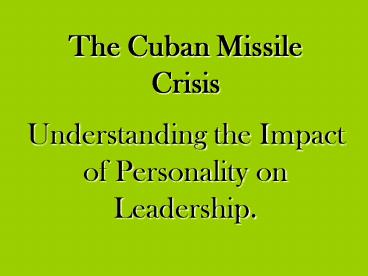The Cuban Missile Crisis - PowerPoint PPT Presentation
1 / 21
Title:
The Cuban Missile Crisis
Description:
A war of Ideology and Unthinkable Weapons: Political and Economic ... The Marxist Revolutionary? Meaning of... Leadership? Style? Restrictions? ... – PowerPoint PPT presentation
Number of Views:200
Avg rating:3.0/5.0
Title: The Cuban Missile Crisis
1
The Cuban Missile Crisis
- Understanding the Impact of Personality on
Leadership.
2
Defining terms
- Leadership
- The capacity to lead.
- Moral
- Sanctioned by or operative on one's conscience
or ethical judgment. - Machiavellian
- Marked by cunning, duplicity, or bad faith.
3
Recommending student sources
- Need for reading materials
- Textbooks inadequate for Crisis
- Online source that you can control.
- Creating a specific reading list.
- ABC-CLIO materials.
4
A war of Ideology and Unthinkable Weapons
Political and Economic
5
Main Protagonists JF Kennedy and N Khrushchev at
Vienna Summit, 1961.
6
Birds of a Feather F Castro and N Khrushchev in
ideological embrace.
7
Secondary Leaders? Mao and U Thant
8
Medium Range and Intermediate Ranges for Russian
Missiles.
9
Evidence presented at the United Nations support
for a blockade.
10
The US Jupiter IRBM 15 in Turkey
11
The Proof Clear evidence of a secret build-up
of missiles (MRBM and IRBM) in Cuba.
12
JFK and military advisors options?
13
Air Strike and/or Invasion?
14
Brinkmanship JFK will stop all Russians ships,
period.
15
US naval vessel and patrol craft intercept and
ward off a Russian freighter.
16
The democrat?
- Meaning of
- Leadership?
- Style?
- Restrictions?
17
Public Opinion?Women Strike for Peace Group
18
The Apparatchik?
- Meaning of
- Leadership?
- Style?
- Restrictions?
19
The Marxist Revolutionary?
- Meaning of
- Leadership?
- Style?
- Restrictions?
20
Leadership and the Crisis Impact.
- Personalities of the leaders.
- Domestic Impact of Foreign Policy.
- Ideological Conflict/Aspirations.
- Third World Rivalries.
- Relations with Allies (esp. USSR and Cuba).
- Nuclear Arms Race.
21
Recommended Reading
- Mark J. White, Missiles in Cuba. 1997.
- John L. Gaddis, We Now Know Rethinking Cold War
History. 1997 - Gaddis, Surprise, Security, and the American
Experience. 2004 - Donald Kagan, On the Origins of War and the
Preservation of Peace. 1995 - Wm J. Medland, The Cuban Missile Crisis Evolving
Historical Perspectives. The History Teacher,
Vol. 23, Nu 4, August 1990





























